
SCIENCE AS CULTURE
Scope & Guideline
Bridging Disciplines: Where Science Meets Culture
Introduction
Aims and Scopes
- Sociocultural Analysis of Science:
The journal investigates how cultural, social, and political contexts shape scientific practices and knowledge production, often highlighting the roles of power, identity, and ethics in science. - Interdisciplinary Approaches:
Emphasizing interdisciplinary research, the journal incorporates perspectives from sociology, anthropology, philosophy, and communication studies to provide a comprehensive analysis of scientific issues. - Critical Examination of Technoscience:
A core focus on the critical assessment of emerging technologies and scientific practices, examining their implications for society, governance, and environmental sustainability. - Public Engagement and Participatory Science:
The journal explores the dynamics of public engagement in scientific discourse, including citizen science and participatory research methods, assessing their impact on knowledge co-production. - Historical Perspectives on Science:
Incorporating historical analysis, the journal contextualizes contemporary scientific debates within broader historical narratives, thereby illuminating the evolution of scientific thought and practices.
Trending and Emerging
- Environmental and Ecological Governance:
Recent publications increasingly focus on environmental governance, emphasizing the role of metrics, participatory approaches, and the socio-political implications of ecological crises in contemporary scientific practices. - Digital and Data Governance:
There is a growing interest in the impacts of digital technologies and data governance on scientific practices, including discussions around data ethics, digital participation, and the implications of big data in environmental and public health contexts. - Participatory and Citizen Science:
The journal is increasingly publishing work on participatory science, highlighting the importance of engaging communities in scientific research and the co-production of knowledge, reflecting a shift toward inclusive scientific practices. - Anthropocene Narratives and Climate Change:
Emerging themes related to the Anthropocene, including climate change discussions and the societal implications of ecological collapse, are gaining prominence, reflecting a critical engagement with contemporary environmental challenges. - Rhetoric and Metaphors in Science:
An increasing number of articles are exploring the role of language, metaphors, and rhetoric in scientific discourse, particularly in relation to genetics and biotechnology, indicating a trend toward a more nuanced understanding of scientific communication.
Declining or Waning
- Traditional Science Communication:
There has been a noticeable decline in papers solely focused on traditional models of science communication, as the journal shifts towards more participatory and inclusive approaches that emphasize co-production of knowledge. - Biopolitics and Genetic Engineering:
Themes centered around biopolitics, particularly those narrowly focused on genetic engineering controversies, have decreased, potentially due to a broader interest in ecological and environmental dimensions of science. - Sociotechnical Imaginaries of the Future:
While still relevant, the exploration of sociotechnical imaginaries related to futuristic technologies has diminished, possibly as the journal pivots towards the immediate social implications of existing technologies. - Controversies in Established Scientific Fields:
Analysis of controversies within well-established scientific fields, such as traditional medicine or established environmental science, has waned, with a shift towards examining emerging and intersectional scientific issues.
Similar Journals

Iride-Filosofia e Discussione Pubblica
Bridging academic rigor with real-world relevance in philosophy.Iride-Filosofia e Discussione Pubblica is an esteemed journal published by SOC ED IL MULINO, dedicated to advancing the field of philosophy through rigorous discourse and public engagement. With an ISSN of 1122-7893 and spanning a rich history from 1997 to 2023, the journal fosters a critical examination of philosophical concepts and their relevance in contemporary society, making it an essential resource for scholars, practitioners, and students alike. Despite its current classification in Q4 of the 2023 Philosophy category, Iride maintains a vital role in promoting diverse perspectives and innovative ideas within the field, as evidenced by its Scopus rank of #676 out of 806 in Arts and Humanities Philosophy, positioning it at the 16th percentile among peers. The journal welcomes contributions that stimulate thought-provoking discussions and encourage public involvement, aiming to bridge the gap between academic philosophy and real-world applications. With its base in Bologna, Italy, Iride represents the dynamic interplay of tradition and modernity in philosophical thought, making it a significant platform for those endeavoring to enrich philosophical discourse.
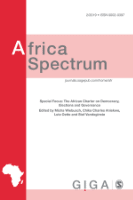
Africa Spectrum
Decoding the Complexities of the African ExperienceAfrica Spectrum, published by SAGE Publications Inc, is a prominent journal dedicated to the exploration of African studies, focusing on cultural, political, and developmental issues within the continent. With its ISSN 0002-0397 and E-ISSN 1868-6869, the journal has garnered a significant reputation, boasting a remarkable impact factor within the Q1 category across various fields, including Cultural Studies, Political Science and International Relations, and Sociology. Since adopting an Open Access model in 2009, Africa Spectrum has made cutting-edge research widely available, fostering scholarly communication and collaboration among researchers, professionals, and students. The journal's diverse scope spans critical analyses of contemporary societal challenges and transformative developments, proving indispensable for those engaged in understanding and addressing the complexities of African contexts. Located in Germany, Africa Spectrum serves as a vital platform for high-quality research that shapes discourses around the African continent and its global interactions, making it an essential resource for anyone invested in the continent's future.
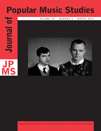
Journal of Popular Music Studies
Navigating the Rhythms of Cultural DiscourseJournal of Popular Music Studies, published by University of California Press, is a preeminent academic journal dedicated to the exploration and analysis of popular music and its cultural implications. With an ISSN of 1524-2226 and an E-ISSN of 1533-1598, this journal encompasses a range of methodologies, encouraging interdisciplinary dialogue across fields such as musicology, cultural studies, and sociology. Since its inception in 1988, it has provided a platform for critical examination of popular music through various lenses, contributing significantly to the understanding of music in contemporary society. The journal maintains a robust reputation, currently holding a Q2 ranking in the Music category of Scopus, positioning itself within the 58th percentile among its peers. As an invaluable resource for researchers, professionals, and students alike, the Journal of Popular Music Studies remains committed to fostering innovative scholarship and discussions that illuminate the impact of popular music on social and cultural landscapes.

SOCIAL HISTORY OF MEDICINE
Exploring the Intersections of Society and MedicineSOCIAL HISTORY OF MEDICINE, published by Oxford University Press, is a premier journal dedicated to advancing the field of medical history through a social lens. With a rich history since its inception in 1988, the journal spans key developments and explorations up to the present, emphasizing the intricate relationships between social structures and medical practices. Holding a Q1 ranking in History and a Q3 ranking in Medicine (miscellaneous), it attests to its influential position within both disciplines, facilitating a comprehensive understanding of how societal factors shape health and medicine. Researchers, professionals, and students alike benefit from its rigorous peer-reviewed articles that encourage interdisciplinary dialogue and foster new insights. The journal is indexed in Scopus, currently ranked 132nd out of 1760 in Arts and Humanities—History, placing it in the 92nd percentile, and 232nd out of 398 in Medicine, with a 41st percentile ranking. Although not open access, the content is invaluable for anyone interested in the historical intersections of medicine, making it an essential resource for scholarly inquiry.
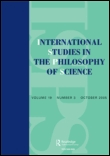
International Studies in the Philosophy of Science
Navigating the intricate relationship between science and philosophy.International Studies in the Philosophy of Science is a distinguished journal published by Routledge Journals, Taylor & Francis Ltd, dedicated to advancing scholarly dialogue in the intersecting realms of philosophy and science. With an ISSN of 0269-8595 and an E-ISSN of 1469-9281, this journal offers a carefully curated collection of research articles, reviews, and discussions that explore critical philosophical questions related to scientific methods, theories, and ethics. Although coverage for the journal in Scopus has been discontinued since 2017, it still maintains a respectable position with a rank of #75 out of 140 in the Arts and Humanities category, showcasing its relevance within the field. While it currently does not offer open access, the journal continues to be an essential resource for researchers, professionals, and students seeking to deepen their understanding of the philosophical underpinnings that inform scientific inquiry. By putting a spotlight on interdisciplinary approaches and fostering robust academic debate, International Studies in the Philosophy of Science plays a vital role in shaping the future discourse in the philosophy of science.
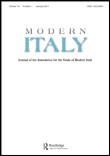
Modern Italy
Diving into Italy's Rich Historical and Cultural LandscapeModern Italy, published by Cambridge University Press, stands as a vital academic journal dedicated to the rich tapestry of Italian culture, history, and societal dynamics. With an ISSN of 1353-2944 and an E-ISSN of 1469-9877, this journal not only reflects on Italy's historical narratives but also engages with contemporary issues pertinent to various fields including Anthropology, Cultural Studies, History, and Sociology and Political Science. As of 2023, it has achieved commendable rankings, falling within the Q1 category in Cultural Studies and History, along with a Q2 ranking in both Anthropology and Sociology. These accolades highlight its influence and commitment to scholarly excellence, making it an essential resource for academics, researchers, and students seeking to deepen their understanding of Italy's past and present. Although the journal does not adopt an open access model, its impactful research and vibrant discussions are accessible through academic institutions and libraries, ensuring that critical insights into Italian studies continue to reach a broad audience.

European Journal for Philosophy of Science
Exploring the Foundations of Scientific ThoughtThe European Journal for Philosophy of Science, published by SPRINGER, stands as a prestigious platform for scholars in the realms of philosophy and history of science. With an impressive impact factor and categorized in the Q1 Quartile for both History and Philosophy of Science and Philosophy, this journal ranks among the top 10% of its peers, reinforcing its critical role in advancing academic discussions and insights within these fields. With its composition of rigorous peer-reviewed articles and a commitment to fostering interdisciplinary dialogue, the journal navigates foundational and contemporary issues that shape scientific inquiry. Although currently not Open Access, it provides invaluable access to researchers, professionals, and students who seek to deepen their understanding of the philosophical underpinnings of scientific practice. Housed in the Netherlands, the journal continuously engages with the evolving landscape of philosophy in the scientific domain, making it a key resource for anyone invested in the intersection of science and philosophy.
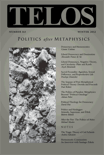
Telos
Fostering critical analysis across the humanities and social sciences.Telos is a leading academic journal published by TELOS PRESS LTD, specializing in the interdisciplinary fields of cultural studies, philosophy, sociology, and political science. With an ISSN of 0090-6514 and E-ISSN 1940-459X, Telos has carved out a significant niche in contemporary discourse, providing a platform for critical analysis and innovative thought. The journal, based in the United States, has demonstrated its impact through its classification in the Q2 category for both cultural studies and philosophy, and is recognized within the Q3 category in sociology and political science. Its Scopus rankings further affirm its influence in the academic community, emphasizing its commitment to advancing scholarly debate and engagement. Although not an open-access publication, it fosters a rich environment for researchers, professionals, and students seeking to explore the intersections of culture, ideology, and social structures. With converged years from 2010 to 2024, Telos remains a pivotal repository of knowledge and a catalyst for dialogue in the humanities and social sciences.

Textile-Cloth and Culture
Exploring the Threads of SocietyTextile-Cloth and Culture, published by ROUTLEDGE JOURNALS, TAYLOR & FRANCIS LTD, stands at the forefront of interdisciplinary research within the field of textile studies, integrating perspectives from arts and humanities. With an ISSN of 1475-9756 and an E-ISSN of 1751-8350, this journal fosters scholarly discourse and innovation from its United Kingdom base. Covering a wide array of topics related to textiles, cloth, and their cultural significance, Textile-Cloth and Culture is categorized in the prestigious Q2 quartile in Arts and Humanities (Miscellaneous) for 2023, holding a solid position in the Scopus ranking at #63 out of 173 journals in the general Arts and Humanities category. Since its inception in 2006, it has become a vital resource for researchers, professionals, and students, emphasizing the profound influence of textiles in cultural contexts. The journal's commitment to high-quality research provides readers with access to insightful studies, critical reviews, and innovative methodologies that further our understanding of the interplay between textiles and society, making it an essential journal for those aiming to stay updated in this dynamic field.
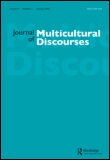
Journal of Multicultural Discourses
Advancing Dialogue Across Diverse Cultural LandscapesThe Journal of Multicultural Discourses, published by Routledge Journals, Taylor & Francis Ltd, is a leading academic platform dedicated to exploring the complexities and dynamics of multiculturalism in today’s interconnected world. Since its inception in 2006, the journal has carved a distinct niche in the fields of Communication, Cultural Studies, and Linguistics, currently ranking in the Q2 quartile for Communication and achieving Q1 status in both Cultural Studies and Linguistics for the year 2023. It serves as a crucial resource for researchers, professionals, and students interested in the intersections of culture, language, and identity. Although it does not offer open-access options, the journal remains committed to advancing scholarly discourse by publishing high-quality, peer-reviewed articles, and critical reviews that shed light on pressing multicultural issues. With its esteemed reputation and significant impact within its academic domains, the Journal of Multicultural Discourses plays an essential role in fostering dialogue and understanding among diverse cultural perspectives, thereby enriching the global academic community.